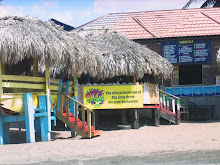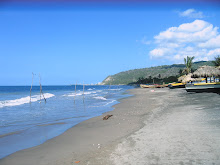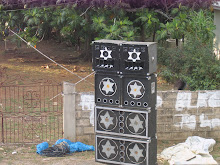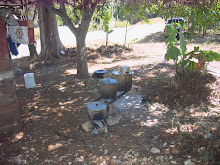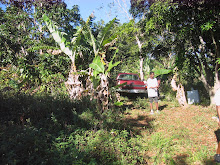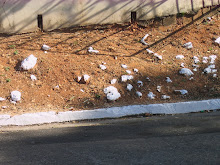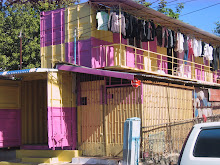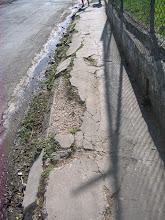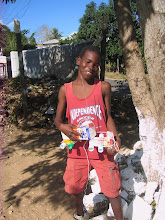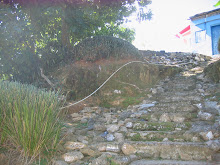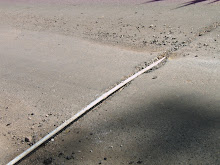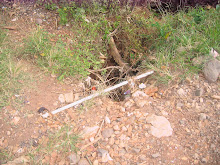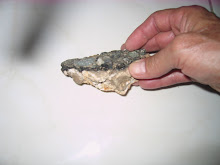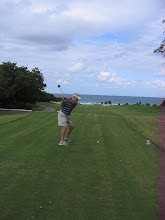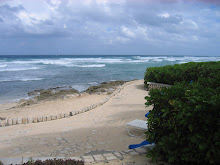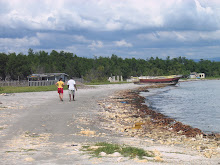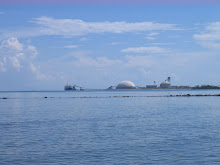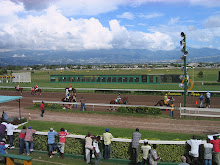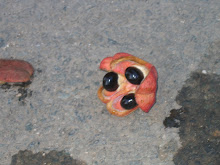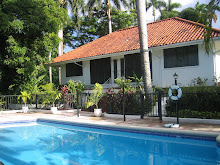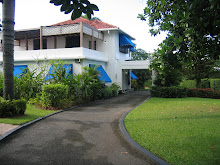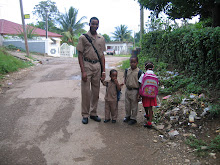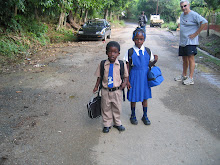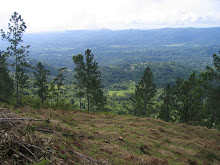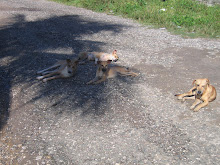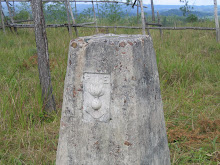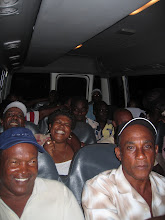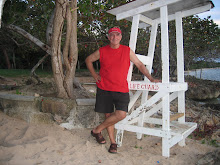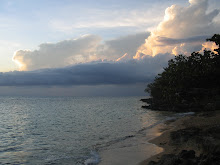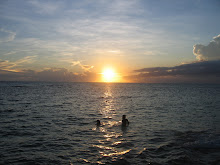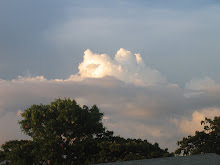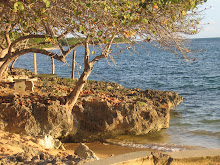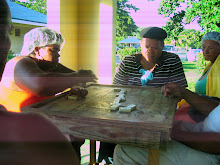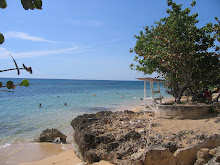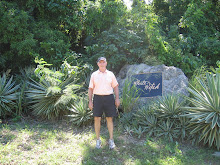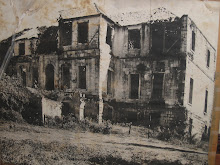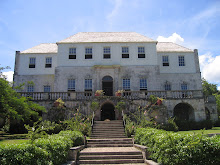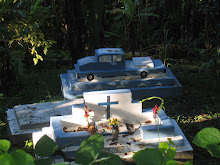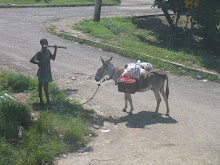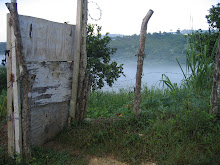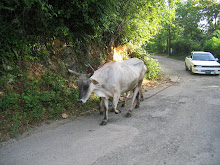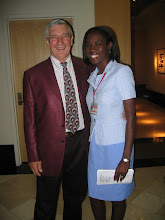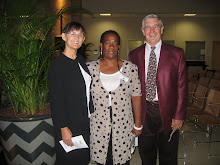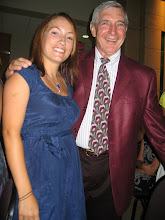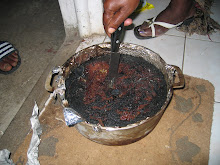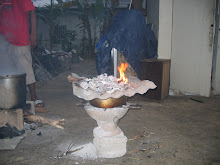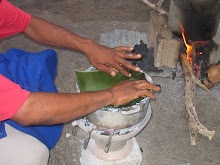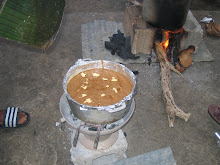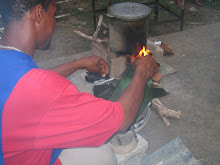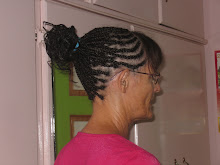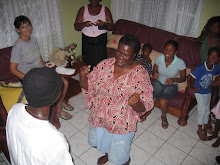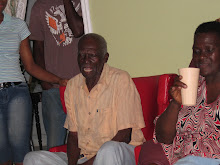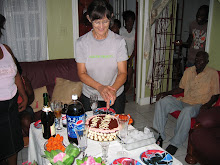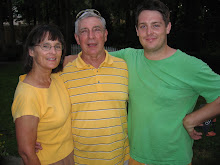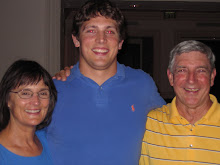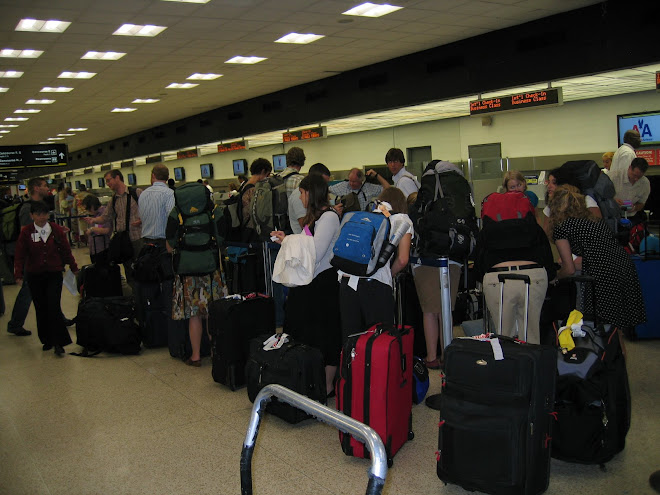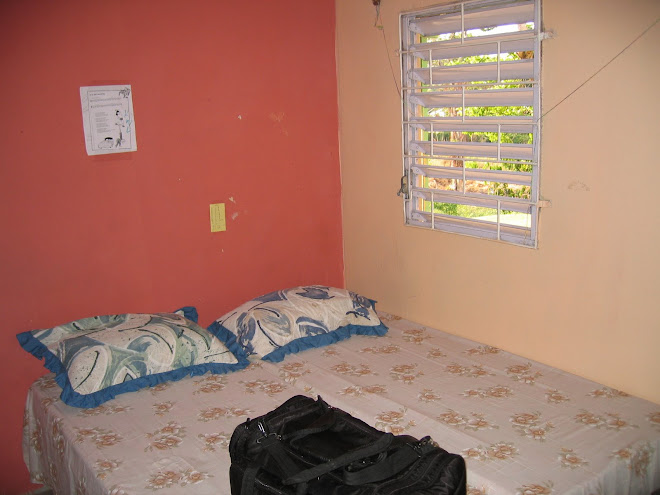Our first weekend away from Chapelton!
We finally decided, at the urging of our Safety and Security Coordinator, that we would take a weekend off and start to explore Jamaica outside our work and home site. We checked the Lonely Planet Jamaica and decided to travel to Falmouth which is located about 18 miles east of Montego Bay and about 60 miles from our apartment in Chapelton. Found a small hotel that was close to rafting and not too far from Rose Hall Mansion and a couple golf courses. We ventured out and planned to meet our roommates from training (Matt and Karen Towne) early Friday evening. We headed to downtown Chapelton around 2: 45 and arrived at 3:10. The place was teeming with school children who were waiting to go home via the taxis and mini-buses…the same form of transportation we use. There do not appear to be school buses in Jamaica…as we know it in the states. Finally, after standing around for about 25 minutes jockeying for a spot we got on a mini-bus at 3:35 [capacity 15- # of riders 23]. The adventure began while we headed straight north; our first stop to change to a taxi was Trout Hall 8 miles north on probably the worst road we’ve ever traveled. We were in the standard Toyota Corolla taxi with four passengers in the front and four in the back. Yep, you read it right, four in the front, two in the passenger seat and two in the driver’s seat! The driver had to reach over the female passenger’s leg to shift. Eight miles should take the “Grand Prix” taxi drivers about 10-15 minutes on these roads….but not the 8 miles to Trout Hall…it took over 30 minutes…the driver could not get up enough speed because of the huge potholes and the weight in the car. Next stop, Cave Valley, another 8 miles or so which was equally as slow not only because of the road (which was not quite as pot-holed as the previous leg) but because we were heading over the peak of the Bull Head Mountains…with a lot of hair pin turns and close to the road cliffs (not a guard rail to be seen); however that did not seem to phase the driver who was driving between 35-45 miles an hour on these treacherous roads…only about 5 feet from the taxi in front of him. We were starting to squirm. At Cave Valley we jumped into another taxi that would take us about 16 miles to Brownstown. The road started to get better, NOT GOOD, just improved. Traffic was heavy (Friday night get-a-way?) so the driver had to drive slower than the previous Mr. Andretti - wannabe! At Brownstown we boarded an SUV taxi…with relatively more space but still cramped, and headed for Discovery Bay and our first view of the North coast and the Caribbean. The roads changed significantly…no potholes, wide (not eight lanes) but wide and not nearly as busy as the narrow mountain roads. At Discovery Bay we boarded a taxi that ate up the next 20 miles of road in about 13-15 minutes…at least we were on good roads and there were only three of us in the car versus the usual 7-8. We arrived at our destination (Fisherman’s Inn at Glistening Waters), 3 km east of Falmouth at 6 pm…met our friends at poolside (they had left their home site three hours earlier than we had), and I immediately consumed a scotch on the rocks…whew! We had dinner, more drinks and then a relatively early retirement…10 pm seemed like midnight compared to our usual lights out routine around 9 pm.
At breakfast on Saturday morning we made plans to take a 90 minute raft trip, called the number(s) listed in the Lonely Planet…but were unable to reach anyone. Plan B had us travel west toward MoBay past, Falmouth to Rose Hall where we took in the guided tour of the Great House Mansion, located on a former 6000 acre sugar cane plantation which was built starting in the 1750’s and completed in the 1770’s. Slaves destroyed the house in the 1831 Christmas Rebellion (for good reason I might add)…it was then left in ruins for the next century. In 1966 a couple from the US started and completed the restoration in 5 years. There is folklore, some true, some untrue about the young woman who was married to an early owner of the place, John Palmer, who supposedly practiced voo-doo…killed three husbands and then was herself killed by her slave lover. Anyway she was known as the “White Witch”….hence the name of one of the golf courses which is on part of the original 6,000 acres…White Witch Golf Course. I drooled for most of my time on the grounds…our time constraints and mixed company (not all golfers) overrode my desire to rent clubs and take off on a course where there were only three foursomes playing.
After flagging down a shuttle bus that was heading to the Ritz Carlton, a resort about a mile down the road from Rose Hall and partners in the whole track (hotel, golf, and mansion), we headed to the pool bar/restaurant for lunch. Up until the moment that we stepped into the Ritz, Margaret and I have mentioned that 99% of US visitors never see the Jamaica we’ve seen. Well….we left that Jamaica for about 2 hours during our visit to the golf course and Ritz for lunch. Felt like we had flown back to a US resort (including prices) and stepped out of our PC existence for a while.
On Sunday, after some morning pool time we packed up and headed back to Chapelton…the pace was somewhat less hectic [Margaret asked each driver if they tek taim? And each nodded affirmatively], the roads were still bad, and the frequency of taxis was less. But after 59 miles and four hours we arrived back safe and sound….oh and tired…because about 100 yards from our hotel on Saturday from about 5:30 pm until 4:30 am there was reggae, reggae, and more reggae that shook the doors (the base was so loud) to our room. The air conditioning, tv, and extra pillows were unable to squelch this “music.” We were told by the waiter on Saturday evening that they always have a party on the last Saturday of the month…Great!!! Just what we needed for our R & R.
Monday, September 29, 2008
Monday, September 22, 2008
Life in the bush
Recently a friend asked if we have air conditioning. It was then I realized you may be curious about our living conditions. Rural Jamaica is on the cusp of moving from a developing to developed country. Areas in Kingston, as well as tourist spots in Montego Bay and along the north and west coasts have modern amenities. The only air conditioning we experience is in the ATM kiosks. No matter who’s taking out money we both cram into the space for a brief moment of bliss. From 8 AM to 5 PM it is HOT and HUMID, much like the southeastern US in the summer [without the fall respite]; albeit, ocean breezes crossing the island do make it somewhat manageable.
We look forward to dusk when the sweat abates. Sweat pours off our legs, arms, backs, heads, etc. Poor Gary is always soaked ¾ of the way on the mile and a half walk to the hospital. No AC there either. Indoors the first thing we check for are cross breeze locations and fans. Many carry kerchiefs to wipe sweat from the body. For shade I walk everywhere with my umbrella up. Men aren’t culturally allowed that luxury unless it’s raining.
Water, for any purpose, is limited. We sometimes have it, sometimes not. There’s no predicting when it will be on and for how long. It may be off for a few days and then on for two hours from 11AM-1PM or 11PM-1AM [neither time block particularly convenient]. Other times it may be on for 24 hours. We have storage tanks that are filled for the off-hours and we keep two large buckets filled in our bathroom. When the water is off our house mother has the luxury of a pump that brings it into the house. We try to use it sparingly because electricity is costly.
This may set your hair afire, but there’s no hot water for showers, laundry or dishes. I’ve learned a whole new tolerance for diminished comfort and sanitation. We’ve now been here for nearly three months and not seen anyone sick or develop rashes for the lack of hot water. There could be something to the useless wastefulness of our antibacterial obsession; and possibly our immune systems are even stronger for the lack of hyper-sanitation. We’ve learned to save water and fuel by taking cold bucket showers. We also water plants with dish and laundry water.
We’re lucky to have a washing machine. During training it was handwashing or nothing.
The laundry dries on a line, unless you forget to watch the weather and fail to note the arriving afternoon tropical downpour [those babies come on like gang busters, no light sprinkles to warn you]. Laundry water is recycled between loads. We start with the whites, pull them out for the darks and reset the wash cycle. Then spin/rinse each in the same order. It’s easier than hand washing but we have to keep in mind to watch the cycles, one distraction and 15 gallons of H2O is literally down the drain.
There’s no internet service in our neighborhood or at the hospital. We walk 1½ miles to the library to do research and communicate with all of you. Once the ECG lab is up and running, there may be enough money to fund internet service on a limited basis for the hospital. No guarantees but that was the suggestion.
Our neighborhood initially looks reasonably modern but after a third glance you see the structures are primarily shells of modernity. Most residents grow some foods in their yards: mango, pear [avocado to us], breadfruit, plantain, banana, oranges, yam, sugar cane, aki, kallaloo, etc., and share what they have with neighbors [sharing and helping is an important Jamaican value]. Visits to the grocery store are rare [and expensive], although we haven’t broken the habit yet; we’re now down to a once a week trip into May Pen to a supermarket that has some of the amenities we’re accustomed to [but don’t really need]. One reason for our diminished travel is Gary’s abhorrence of the costly, torturous ten mile trek.
The roads are shared by pedestrians, vehicles [mainly taxis and mini buses], goats, donkeys, cows, chickens, and the ever-present hoard of dogs. Sidewalks, if present, are useless, crumbling clumps of stone. All forms of transport, regardless of the species, take place in the badly pot-holed roads. It’s the pot-holes that make it safe for all to share the roads; cars can’t drive fast [except on the main roads where the taxis and buses drive fast regardless of road conditions]. That reminds me; Gary recently said that even if Peace Corps allowed us to drive he’s not sure he would feel safe driving in Jamaica. The back roads are fine; it’s the main roads that are worrisome.
Take a minute to look around you and appreciate what you have, but please don’t take it for granted or let it reduce our resources.
Taik cyar, Margaret
We look forward to dusk when the sweat abates. Sweat pours off our legs, arms, backs, heads, etc. Poor Gary is always soaked ¾ of the way on the mile and a half walk to the hospital. No AC there either. Indoors the first thing we check for are cross breeze locations and fans. Many carry kerchiefs to wipe sweat from the body. For shade I walk everywhere with my umbrella up. Men aren’t culturally allowed that luxury unless it’s raining.
Water, for any purpose, is limited. We sometimes have it, sometimes not. There’s no predicting when it will be on and for how long. It may be off for a few days and then on for two hours from 11AM-1PM or 11PM-1AM [neither time block particularly convenient]. Other times it may be on for 24 hours. We have storage tanks that are filled for the off-hours and we keep two large buckets filled in our bathroom. When the water is off our house mother has the luxury of a pump that brings it into the house. We try to use it sparingly because electricity is costly.
This may set your hair afire, but there’s no hot water for showers, laundry or dishes. I’ve learned a whole new tolerance for diminished comfort and sanitation. We’ve now been here for nearly three months and not seen anyone sick or develop rashes for the lack of hot water. There could be something to the useless wastefulness of our antibacterial obsession; and possibly our immune systems are even stronger for the lack of hyper-sanitation. We’ve learned to save water and fuel by taking cold bucket showers. We also water plants with dish and laundry water.
We’re lucky to have a washing machine. During training it was handwashing or nothing.
The laundry dries on a line, unless you forget to watch the weather and fail to note the arriving afternoon tropical downpour [those babies come on like gang busters, no light sprinkles to warn you]. Laundry water is recycled between loads. We start with the whites, pull them out for the darks and reset the wash cycle. Then spin/rinse each in the same order. It’s easier than hand washing but we have to keep in mind to watch the cycles, one distraction and 15 gallons of H2O is literally down the drain.
There’s no internet service in our neighborhood or at the hospital. We walk 1½ miles to the library to do research and communicate with all of you. Once the ECG lab is up and running, there may be enough money to fund internet service on a limited basis for the hospital. No guarantees but that was the suggestion.
Our neighborhood initially looks reasonably modern but after a third glance you see the structures are primarily shells of modernity. Most residents grow some foods in their yards: mango, pear [avocado to us], breadfruit, plantain, banana, oranges, yam, sugar cane, aki, kallaloo, etc., and share what they have with neighbors [sharing and helping is an important Jamaican value]. Visits to the grocery store are rare [and expensive], although we haven’t broken the habit yet; we’re now down to a once a week trip into May Pen to a supermarket that has some of the amenities we’re accustomed to [but don’t really need]. One reason for our diminished travel is Gary’s abhorrence of the costly, torturous ten mile trek.
The roads are shared by pedestrians, vehicles [mainly taxis and mini buses], goats, donkeys, cows, chickens, and the ever-present hoard of dogs. Sidewalks, if present, are useless, crumbling clumps of stone. All forms of transport, regardless of the species, take place in the badly pot-holed roads. It’s the pot-holes that make it safe for all to share the roads; cars can’t drive fast [except on the main roads where the taxis and buses drive fast regardless of road conditions]. That reminds me; Gary recently said that even if Peace Corps allowed us to drive he’s not sure he would feel safe driving in Jamaica. The back roads are fine; it’s the main roads that are worrisome.
Take a minute to look around you and appreciate what you have, but please don’t take it for granted or let it reduce our resources.
Taik cyar, Margaret
Wednesday, September 17, 2008
Things are starting to move.....
Slow but Steady….
Our daily schedule books are starting to look a little more used in the past two weeks with the number of meetings and tasks increasing. One key happening occurred last week when I decided to contact a couple former colleagues to see if they had any ideas on how I could get some resources. One of them, Thomas Allison, a former doctoral colleague at Pitt, has worked at Mayo Clinic almost as long as I was at BU. I proceeded to explain what we were doing since I hadn’t seen him in a couple years….then I asked him if he knew of any foundations or organizations that donated used equipment or computers. Within four hours of my original email he informed me that he had an electrocardiograph machine waiting to be shipped to Jamaica along with supplies, batteries, and electrodes. I just found out today (Tuesday, September 16, 2008) that the machine arrived in Kingston and will be delivered to Chapelton Community Hospital next week. The realization of an EKG lab here at the hospital has materialized. I could hardly sleep one night last week thinking of how I would arrange, set-up, and train the nurses here at the hospital. It also turned out that a doctor at Mayo Clinic, a Jamaican, called me and wants to include me in a fact finding mission that the Jamaican Minnesota Organization is making in November. They are going to visit Chapelton as well as the whole Clarendon parish.
Margaret has a number of presentations in the health and healthy lifestyles area and is currently about 20 miles west of the hospital with another health educator. We both attended the Caribbean Health Day fair at May Pen. Although a minor event it was an attempt to share literature about health and healthy lifestyles with community members.
Another task that we are undertaking, a resurrection of a former community center in our neighborhood, is fraught with a number of challenges. Politics and religion may play a heavy hand in this plan…but we are talking to former community leaders (from both political parties), church representatives, and leaders in other communities to see if we can facilitate this venture.
Caribbean weather has been pretty stable for the last week or 10 days with the passing of Ike (just a little rain from that beauty), but the temperatures still top out at 32 or 33 degrees Celsius mid-day. Can’t wait till November/December when the locals promised me that I’ll need a sweater…Yea, mon, yu see!.
Our daily schedule books are starting to look a little more used in the past two weeks with the number of meetings and tasks increasing. One key happening occurred last week when I decided to contact a couple former colleagues to see if they had any ideas on how I could get some resources. One of them, Thomas Allison, a former doctoral colleague at Pitt, has worked at Mayo Clinic almost as long as I was at BU. I proceeded to explain what we were doing since I hadn’t seen him in a couple years….then I asked him if he knew of any foundations or organizations that donated used equipment or computers. Within four hours of my original email he informed me that he had an electrocardiograph machine waiting to be shipped to Jamaica along with supplies, batteries, and electrodes. I just found out today (Tuesday, September 16, 2008) that the machine arrived in Kingston and will be delivered to Chapelton Community Hospital next week. The realization of an EKG lab here at the hospital has materialized. I could hardly sleep one night last week thinking of how I would arrange, set-up, and train the nurses here at the hospital. It also turned out that a doctor at Mayo Clinic, a Jamaican, called me and wants to include me in a fact finding mission that the Jamaican Minnesota Organization is making in November. They are going to visit Chapelton as well as the whole Clarendon parish.
Margaret has a number of presentations in the health and healthy lifestyles area and is currently about 20 miles west of the hospital with another health educator. We both attended the Caribbean Health Day fair at May Pen. Although a minor event it was an attempt to share literature about health and healthy lifestyles with community members.
Another task that we are undertaking, a resurrection of a former community center in our neighborhood, is fraught with a number of challenges. Politics and religion may play a heavy hand in this plan…but we are talking to former community leaders (from both political parties), church representatives, and leaders in other communities to see if we can facilitate this venture.
Caribbean weather has been pretty stable for the last week or 10 days with the passing of Ike (just a little rain from that beauty), but the temperatures still top out at 32 or 33 degrees Celsius mid-day. Can’t wait till November/December when the locals promised me that I’ll need a sweater…Yea, mon, yu see!.
Thursday, September 4, 2008
A Jamaican moment
Recently I had an instructive experience suggestive of one cultural contrast between Americans and Jamaicans. I was expected to meet two Health Educators from the hospital at a specific site in town at 11:30 AM; we were headed into the bush [country] to talk with rural community members about health issues of their choice [HIV/AIDS, blood pressure, PAP tests, and fertility were the topics asked about that day]. The plan was to take a taxi into the hills to a remote area about five miles away.
Like a good American I arrived at the meeting spot at 11:30, right on time. After waiting 30 minutes I began to think I may have gone to the wrong location or misunderstood the Patois laced instructions, so I headed toward the hospital and here they came. They asked how long I’d been waiting; I told them and one said “Jamaicans are terrible about time”. I responded that perhaps, rather than terrible, they are just different from Americans.
Fast forward to the hills: we were dropped off at the home of a woman who died recently and there were 13 men in the front yard preparing her grave. None were relatives, I suppose because she had no male offspring [I only guess, because as an observer, I could barely understand what was said, the Patois was DENSE], all were community members who had dug the six foot grave and were preparing the elaborate 4’ X 10’ concrete cover Jamaicans prefer to the grass we use. With few tools and several buckets of concrete these men were constructing the cover with great attention to detail and care. It was a kind and loving commitment to their neighbor.
After an hour we walked up the hill a mile to another grave preparation site. Here there were 47 people, family and friends doing the same thing for their aunt, friend or neighbor [she had no children or husband]. In this case women and children also played roles. The likl pikni dem [children] shoveled the soil from the grave into a wheel barrow and carted it off to the bush. The men built the cover which was far more elaborate than the first site. The women cooked in a tent and fed everyone.
At this point I said to the Health Educators that these two situations demonstrate a difference between American and Jamaican use of time. Each of these people had dropped what they were doing for several days to see that the deceased were lovingly and respectfully put to rest. Regardless of the time demands on them, these women needed to be honored. I told them that in America we pay to have someone take care of these duties. As someone who has buried a mother, mother-in-law, and brother-in-law I can attest that an early call was made to a funeral director so all would be taken care of. It never occurred to me that there might be another way.
Jamaicans use their time differently. If there’s an opportunity to chat with you or bury you those become the important options. Time is money for most Americans; we can’t take the time to chat…………….. or bury someone ourselves, certainly not a neighbor.
Some of you know I have been carting around the ashes of my father since 1976 and my brother since 2001 [weird, yes, but as the last in the family I knew I couldn’t just leave their remains in some remote place that I might never return to]. When we bought our property in Canaan, NY one of the most appealing things to me about it was that it had a small graveyard on it with headstones from the 1820’s. I knew I had found a place to finally put those ashes to rest. Now I hope that, with my family by my side, we can do it the Jamaican way and dig their graves and fashion those head stones ourselves.
Taik Taim [take time], Margaret
PS: recall from an earlier posting, the Jamaican taxi and bus drivers rarely taik taim.
Like a good American I arrived at the meeting spot at 11:30, right on time. After waiting 30 minutes I began to think I may have gone to the wrong location or misunderstood the Patois laced instructions, so I headed toward the hospital and here they came. They asked how long I’d been waiting; I told them and one said “Jamaicans are terrible about time”. I responded that perhaps, rather than terrible, they are just different from Americans.
Fast forward to the hills: we were dropped off at the home of a woman who died recently and there were 13 men in the front yard preparing her grave. None were relatives, I suppose because she had no male offspring [I only guess, because as an observer, I could barely understand what was said, the Patois was DENSE], all were community members who had dug the six foot grave and were preparing the elaborate 4’ X 10’ concrete cover Jamaicans prefer to the grass we use. With few tools and several buckets of concrete these men were constructing the cover with great attention to detail and care. It was a kind and loving commitment to their neighbor.
After an hour we walked up the hill a mile to another grave preparation site. Here there were 47 people, family and friends doing the same thing for their aunt, friend or neighbor [she had no children or husband]. In this case women and children also played roles. The likl pikni dem [children] shoveled the soil from the grave into a wheel barrow and carted it off to the bush. The men built the cover which was far more elaborate than the first site. The women cooked in a tent and fed everyone.
At this point I said to the Health Educators that these two situations demonstrate a difference between American and Jamaican use of time. Each of these people had dropped what they were doing for several days to see that the deceased were lovingly and respectfully put to rest. Regardless of the time demands on them, these women needed to be honored. I told them that in America we pay to have someone take care of these duties. As someone who has buried a mother, mother-in-law, and brother-in-law I can attest that an early call was made to a funeral director so all would be taken care of. It never occurred to me that there might be another way.
Jamaicans use their time differently. If there’s an opportunity to chat with you or bury you those become the important options. Time is money for most Americans; we can’t take the time to chat…………….. or bury someone ourselves, certainly not a neighbor.
Some of you know I have been carting around the ashes of my father since 1976 and my brother since 2001 [weird, yes, but as the last in the family I knew I couldn’t just leave their remains in some remote place that I might never return to]. When we bought our property in Canaan, NY one of the most appealing things to me about it was that it had a small graveyard on it with headstones from the 1820’s. I knew I had found a place to finally put those ashes to rest. Now I hope that, with my family by my side, we can do it the Jamaican way and dig their graves and fashion those head stones ourselves.
Taik Taim [take time], Margaret
PS: recall from an earlier posting, the Jamaican taxi and bus drivers rarely taik taim.
Tuesday, September 2, 2008
Ready to work
We are officially Peace Corps Volunteers! Passed all of our tests and were sworn in by the US Ambassador on Thursday August 28 [Gary’s birthday] just before Gustav hit land [it was no big deal in Chapelton-we're protected by the Bull Head Mtns to the north]. Now it’s down to work.
We have several projects we will be working on; all are supposed to be in advisory or training capacities. The first will be to train the nursing staff on the use of an ECG [electrocardiogram]. They say they have one in the hospital but when a test has to be administered they have to bring in an outside contractor. It will save them considerable time and money if they can do it themselves and it will certainly be beneficial for the patients. The only problem is, so far, they can’t seem to locate the equipment. It appears that what they thought was an ECG was only a monitor. We’re headed to the hospital this morning to search in all the nooks and crannies.
Another thing the hospital wants us to do is set up a Wellness Center for employees and patients. We’ll have to do some community assessments to insure it’s structured to meet the stakeholders needs and wants. Once it’s set up we’ll train staff to run it.
A very large project will be to reorganize the admissions and records department’s operations. Right now it doesn’t function effectively. For instance, if a patient arrives today their record cannot be retrieved again for a week, even if they must return tomorrow. We’re hoping to get the hospital set up with linked computers and get several staff trained to operate, maintain, and repair the software. Right now we’re investigating several options for accessing hardware and software. We’ll need to locate at least four computers for them.
When patients arrive at the hospital they have a minimum three hour wait before they’ll be seen. The waiting room probably seats at least 100 people, all just sitting and waiting. At one end there is a TV mounted on the wall for some to watch. The staff has suggested having health education tapes playing. We will see what can be done. We can do presentations on a whole slew of topics from the basics like BP, cholesterol, diabetes, heart disease, etc. to sleep, skin health, hand washing [this is very important in Jamaica, breaking the oral/fecal contamination cycle is a major health problem], exercise, etc. Over time we figure we can produce at least a dozen of these tapes.
In the community there is interest in reviving a community association. Apparently the quality of life has fallen off and some want to take action to stem the tide. Littering [a chronic Jamaican problem], loud Reggae music 24/7, packs of dogs roaming the streets 24/7, and groups of aimless young men with nothing to do are just some of the concerns. We are coordinating with church and civic leaders to identify necessary/available resources, interest, and potential solutions.
As a spin off of the community association several people want to revive a defunct community center. One thing they want are fitness classes. I’ll train residents on how to develop and run exercise sessions. As of now five women are walking in the community with me [they all need good shoes to support their bodies-I’m asking a former colleague at BU to help me locate donated shoes, if you have any or know of a source please email be at gskrinar@gmail.com].
We’re sure that more projects will surface as we become deeply integrated into the hospital community. We’ll keep you apprised of our successes and failures.
Will add more pics with the next posting.
Laita [Jamaican’s don’t say good-bye, it’s too permanent, later is temporary], Margaret
We have several projects we will be working on; all are supposed to be in advisory or training capacities. The first will be to train the nursing staff on the use of an ECG [electrocardiogram]. They say they have one in the hospital but when a test has to be administered they have to bring in an outside contractor. It will save them considerable time and money if they can do it themselves and it will certainly be beneficial for the patients. The only problem is, so far, they can’t seem to locate the equipment. It appears that what they thought was an ECG was only a monitor. We’re headed to the hospital this morning to search in all the nooks and crannies.
Another thing the hospital wants us to do is set up a Wellness Center for employees and patients. We’ll have to do some community assessments to insure it’s structured to meet the stakeholders needs and wants. Once it’s set up we’ll train staff to run it.
A very large project will be to reorganize the admissions and records department’s operations. Right now it doesn’t function effectively. For instance, if a patient arrives today their record cannot be retrieved again for a week, even if they must return tomorrow. We’re hoping to get the hospital set up with linked computers and get several staff trained to operate, maintain, and repair the software. Right now we’re investigating several options for accessing hardware and software. We’ll need to locate at least four computers for them.
When patients arrive at the hospital they have a minimum three hour wait before they’ll be seen. The waiting room probably seats at least 100 people, all just sitting and waiting. At one end there is a TV mounted on the wall for some to watch. The staff has suggested having health education tapes playing. We will see what can be done. We can do presentations on a whole slew of topics from the basics like BP, cholesterol, diabetes, heart disease, etc. to sleep, skin health, hand washing [this is very important in Jamaica, breaking the oral/fecal contamination cycle is a major health problem], exercise, etc. Over time we figure we can produce at least a dozen of these tapes.
In the community there is interest in reviving a community association. Apparently the quality of life has fallen off and some want to take action to stem the tide. Littering [a chronic Jamaican problem], loud Reggae music 24/7, packs of dogs roaming the streets 24/7, and groups of aimless young men with nothing to do are just some of the concerns. We are coordinating with church and civic leaders to identify necessary/available resources, interest, and potential solutions.
As a spin off of the community association several people want to revive a defunct community center. One thing they want are fitness classes. I’ll train residents on how to develop and run exercise sessions. As of now five women are walking in the community with me [they all need good shoes to support their bodies-I’m asking a former colleague at BU to help me locate donated shoes, if you have any or know of a source please email be at gskrinar@gmail.com].
We’re sure that more projects will surface as we become deeply integrated into the hospital community. We’ll keep you apprised of our successes and failures.
Will add more pics with the next posting.
Laita [Jamaican’s don’t say good-bye, it’s too permanent, later is temporary], Margaret
Subscribe to:
Comments (Atom)



